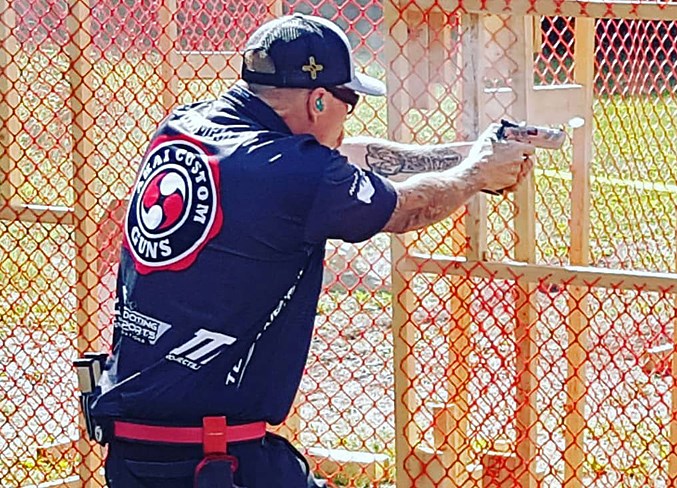A competitive firearm aficionado from Sundre is headed to Jamaica next week for the International Practical Shooting Confederation's Pan American Handgun Championship.
Ian Jones, 37, has been shooting competitively for about eight years but also has prior experience with firearms.
“I did it quite a bit in Ontario when I was younger,” he said, adding he recalls going out on hunting excursions as a child. The family photo album includes pictures of him at the age of about five hunting with his dad.
“It’s something I’ve always been around.”
However, life’s journey led him on a temporary hiatus from shooting. In 2003, following previous visits out west, he decided to relocate from Ontario and eventually settled in Sundre.
Although he no longer hunts — primarily due to the limited number of hours in a week — Jones did find himself developing along the way a passion for putting his marksmanship to the test.
“I enjoy competition — it’s something that drives me to perform better.”
Additionally, he said the sport has helped forge some close relationships with individuals who share his enthusiasm.
“I’ve got good friends I shoot with — we travel to major matches.”
In May, Jones competed in Jackson for the Mississippi Classic United States Practical Shooting Association (USPSA) State Pistol Competition. Over the Canada Day long weekend he was in Rocky Mountain House for the 2018 International Practical Shooting Confederation (IPSC) Alberta Provincials. In August, he will be going to Manitoba for the 2018 IPSC Canadian National Championship.
The Pan American Handgun Championship in Kingston, Jamaica takes place July 23-27, and as a member of Team Canada he will also be participating in the ceremonies.
It is sponsored by Akai Custom Guns, a Florida-based firearms manufacturer that makes custom 2011 pistols used in competitions — essentially a modernized version of the classic 1911 handgun that served as the standard-issue sidearm for the U.S. Armed Forces from 1911 to 1986.
Jones recently placed third provincially and in 2017 was ranked fifth in Canada, he said.
The competitions put to the test not only a marksman’s ability to fire accurately but also in rapid succession. The goal is to score as many points as possible per second. A contestant can take extra shots at a target before moving onto the next, but that comes at the cost of additional time, he said, adding that getting through a course typically takes anywhere from 20 to 30 seconds.
Since U.S. laws allow for larger clip sizes, getting through a heat without reloading is possible. But in Canada, which has restrictions on magazine capacities, there is the added element of having to reload swiftly, he said.
At all times, safety is a priority. Everyone wants to push and go fast, but there is a zero tolerance approach that results in instant disqualifications for competitors who are unsafe in handling their firearms, he said.
Anyone considering trying out a competition can visit ipscalberta.com for more information on the organization and contest rules.
The most challenging aspect of competing is the mental game of not letting the pressure or doubts impact performance, he said, adding there are no mulligans or do-overs.
“You can do it well 100 times in practice, but screw it up once in competition and that’s the way it is.”



